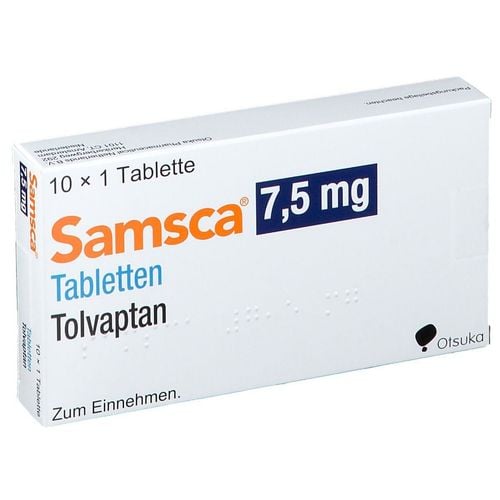This is an automatically translated article.
Chromate is a preparation of chromium metal, often indicated to supplement ions for the body in case of deficiency or inability to absorb chromium. So what are the indications and how to use the drug?
1. What is Chromate?
Chromate belongs to the group of vitamin and mineral drugs, containing the main ingredient is chromium metal - a trace element necessary for normal and healthy development of the body. Chrome is found in many foods such as broccoli, liver, cheese, brewer's yeast,... However, if the diet is nutritionally deficient or the body cannot absorb it, it is necessary to supplement with preparations containing contains chrome. Chrome has a stabilizing effect on blood sugar, a positive effect on the organ of vision, and is an important factor in the development of the fetus. The mineral chrome participates in the breakdown of proteins, participates in glucose, insulin and blood lipid metabolism. In vivo, Chromate has the main effect of stabilizing blood sugar through a mechanism that regulates insulin receptor (IR)-mediated insulin signaling. The IR-mediated signaling pathway includes phosphorylation of multiple intracellular regions and protein kinases, and downstream effector molecules. The drug can be absorbed through the gastrointestinal tract or directly into the systemic circulation. The ability to absorb from the gastrointestinal tract is only about 10%, the Chrome compounds with valence VI are easier to absorb than the valence form III. After entering the cell, Chrome VI will be reduced to Chrome III and then bound to proteins or macromolecules in the form of complexes. Chromate distributes to most tissues in the body and accumulates in the liver, kidneys, spleen, soft tissues and bones. In the blood, most Chrome III binds to high-molecular-weight proteins (95%) such as Transferrin, a few to low-molecular-weight oligopeptides. The drug is metabolised in the liver and eliminated mostly in the urine, with a small amount in the hair, sweat and bile.
2. Indications of the drug Chromate
Chromate is indicated in the following pathological cases:
Mineral supplements in cases of body weakness due to inadequate nutrition. Patients with severe vomiting and diarrhea cause nutritional deficiencies that cannot be compensated by diet. Mineral supplement for diabetics and weight loss people. Pregnant and lactating women with inadequate nutrition.
3. Contraindications of the drug Chromate
Cases where the use of Chromate is not indicated include:
Patients who are allergic to Chrome element or any other ingredient of the drug. Patients with impaired renal function are relatively contraindicated to Chromate. Note when using Chromate drugs include:
Chromate affects chemical reactions in the brain, so it can aggravate symptoms of neuropsychiatric diseases such as depression and schizophrenia, ... Patients with a history of skin allergies when exposed to Chrome may also develop drug allergies when used orally or parenterally. In patients with moderate to severe renal impairment, the use of Chromate may worsen the symptoms of the disease. The drug is metabolized and accumulated in the liver, so patients with impaired liver function should not use preparations containing Chrome. At recommended doses, Chromate is relatively safe. However, there is not enough evidence of safety for the fetus, so pregnant women, especially in the first month of pregnancy, should not take the drug. There are no adequate studies on the use of the drug in children. Therefore, consult your doctor before using for this object.
4. Chromate drug interactions
Chromate in combination with insulin or other antidiabetic drugs may increase the effectiveness of blood sugar control. However, to avoid excessive hypoglycemia, it is necessary to monitor and adjust the insulin dose accordingly. Concomitant administration of Chromate and Levothyroxine may decrease the absorption of Levothyroxine in the body. If the combination must be used, Levothyroxine should be used 30 minutes before or after 3-4 hours. Non-steroidal anti-inflammatory drugs (NSAIDs) and aspirin can increase chromate levels in the body and increase side effects. Concomitant use with other types of vitamin C, vitamin B can increase the absorption of the drug. Alcohol, tobacco and fermented foods can alter the bioavailability of the drug.
5. Dosage and usage
Usage:
Chromate is prepared in the form of oral or intramuscular injection. Only use when the diet is incomplete or the body cannot tolerate Chrome. Dosage:
Children from 0 to 6 months old dose 0.2 mcg / day. Children 7 to 12 months of age are given 5.5 mcg/day. Children 12 to 24 months of age receive 11mcg/day. Children 24 to 36 months of age receive doses of 10 to 80 micrograms (mcg) per day. Children 4 to 6 years of age receive a dose of 120 mcg/day. Children 7 to 10 years of age receive a dose of 50 to 200 mcg/day. Children over 10 years of age and adults take doses of 50 to 200 mcg/day. If you forget to take a dose, use it again as soon as possible. However, if it is almost time for your next dose, skip the missed dose and take your next dose on time. Do not use a double dose of Chromate missed. Dosage is for reference only, depending on the condition and condition of each person, the doctor will have an appropriate treatment dose. 6. Side effects of Chromate Some unwanted effects that may be encountered when using Chromate include:
Gastritis, nausea and vomiting. Headache and insomnia. Mood swings, anxiety, irritability and depression. Allergic reactions, erythema, pruritus and urticaria. Taking high doses can cause coronary heart disease, hypoglycemia and obesity. In summary, Chromate is a trace element that helps to supplement minerals for the body. In a normal diet, it is very difficult to be deficient in this metal. So only use when the body can not tolerate or absorb chromium under the doctor's prescription.













